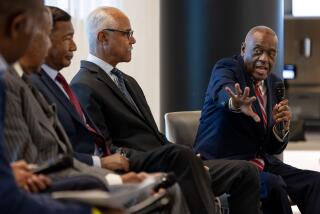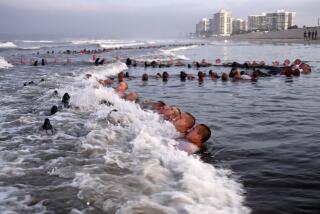Navy’s Chief of Chaplains’ Concerns Include the Worldly, as Well as Divine
- Share via
Barry C. Black is an African American, a son of inner-city Baltimore raised by a single parent, a vegetarian, a self-confessed chess addict, a dedicated runner and a fan of the writings of the ancient Stoic philosophers.
He’s also a two-star admiral in the Navy.
That last fact surprises some people--such as the retired officer who chewed him out recently for parking in a lot at Andrews Air Force Base that is reserved for generals and admirals, after assuming that Rear Adm. Black didn’t belong there. A few years earlier, police officers in San Diego spread-eagled him across their patrol car when they found him walking in his own neighborhood one night.
“Racial myths continue to plague our land,” concluded Black, 52.
In fact, his biggest surprise in becoming Navy chief of chaplains last summer is the amount of attention attracted by his being the first black person to hold that post, he said. “I thought the nation had moved beyond the color of one’s skin being a critical factor.”
Throughout his career, he has resisted being seen as a voice for black people, he said in an interview in his office near the Pentagon. When reporting to a new post, he recalled, “I used to tell the command chaplain, ‘Sir, I don’t run Martin Luther King Day, and I don’t run Black History Month.’ ”
Yet his success underscores the limits that exist for African Americans, even in the military, he said. He gestured toward a photograph of his 1998 “Capstone” class, an orientation session for new generals and admirals: Of the 27 flag officers posing at Fort Bragg, N.C., he is the only black person.
“That’s Exhibit A,” he said, “The old glass ceiling.”
Today he’s one of nine African Americans among the Navy’s 220 admirals. Black, a Seventh-Day Adventist, presides over about 1,400 chaplains--Protestant, Catholic, Orthodox Christian and Jewish--who minister to the Navy, the Marine Corps, the Coast Guard and the Merchant Marine. He also helps supervise lay leaders for the Hindu, Buddhist and Islamic faiths.
That’s a big change from inner-city Baltimore, where “I never met a white person until I was 16.”
His mother, raising eight children, ingrained in him an industriousness that characterizes his approach to life. His allowance was determined by the number of Bible passages he’d memorized that week--one dime per verse. He was so good at it that his mother was forced to put him on a flat rate, he said.
Black doesn’t do things by half measures. When he joined the Navy in 1976 and noticed that sailors related well to illustrations drawn from movies, he made a project of viewing every movie that won an Oscar for best picture--”starting with ‘Wings’ in 1928.”
Likewise, he took up chess when he noticed many sailors spent hours playing the game while at sea. He wound up so engrossed that, when posted to Annapolis, Md., he commuted to New York every weekend to compete at the Manhattan Chess Club.
Being the Navy’s top chaplain presents unique challenges, he said. Civilian religious leaders usually minister only within their own denomination, he noted, while he deals with several faiths: “You are providing ministry in a pluralistic setting.”
He supervises the chaplain community, and ministering to the ministers requires much travel. During October, he was on the road for all but four days, apart from his family. Black is married with three sons, ages 11 to 22.
In his office, he devotes about 40% of his time to briefings on various issues. On a typical day recently, he was being briefed on plans for chaplains in the future, when the Navy’s new “smart ships” may have crews of only about 300.
The Navy maintains a ratio of about one chaplain for every 600 deployed sailors. Under the current system, those new ships would be too small to have their own chaplains. Black could lower that ratio--but at the expense of ministering to sailors’ families back in port.
“When you’re underway [at sea], you need the divine and transcendent,” he said. But the Navy also must take care of the families of deployed sailors.
And much of his job is devoted to budget issues. “There’s a proverb that says, ‘Money answereth all things,’ ” he said with a sigh. “I’m beginning to believe that.”
Black generally gets good reviews. “He’s a chaplain’s chaplain,” said Rabbi James L. Apple, who spent 26 years in the Navy. “He’s a good preacher, he’s well-read and he’s compassionate.”
More to Read
Sign up for Essential California
The most important California stories and recommendations in your inbox every morning.
You may occasionally receive promotional content from the Los Angeles Times.













